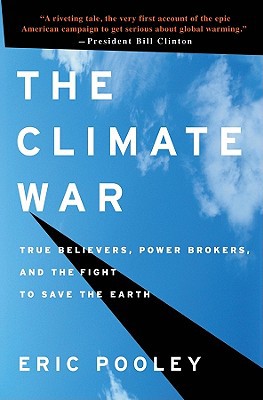

| THE CLIMATE WAR True Believers, Power Brokers, and the Fight To Save the Earth Eric Pooley New York, Hyperion, June 2010 |
Rating: 5.0 High |
|||
| ISBN-13 978-1-4013-2326-4 | ||||
| ISBN-10 1-4013-2326-X | 481p. | HC | $27.99 | |
| Page 8: | "...the north polar ice cap—which had been there for three million years, give or take, equal in size the lower forty-eight U.S. states, give or take..." | |
| Missing word: S/B "equal in size to the lower forty-eight". |
| Page 43: | "...and great tracks of barren land will be reclaimed." | |
| Spelling: S/B "great tracts". (This comes from a video by Western Fuels Association front group the Greening Earth Society, and was probably transcribed from the audio track.) |
| Page 60: | "Next Graff hired a lawyer named David Roe, whose grandfather had founded the nation's first electric utility, which eventually became Pacific Gas & Electric." | |
| My research shows the first electrical generating station in northern California was built at Potrero Point in 1890. Samuel Insull established the Western Edison Light Company in Chicago in 1882. It is likely that there were even earlier electric utilities farther east. Thus I refute this claim. |
| Page 60: | From the footnote: "The heat—equivalent to 40 percent of a plant's power output—is usually wasted." | |
| Wrong end of the ratio: S/B "60-65 percent", since large electrical plants are typically 35-40 percent efficient. |
| Page 85: | "...and used Magic Markers and flip charts..." | |
| If capitalized, this denotes a specific product that probably needs a trademark symbol: S/B "Magic Markers (tm)". |
| Page 86: | "The so-called Btu tax, championed in 1993 by Gore..." | |
| Capitalization: S/B "BTU tax". This form appears in multiple other places throughout the book. At least they are consistent. |
| Page 91: | "...choice between the earth and the economy..." | |
| Capitalization: S/B "Earth". |
| Page 114: | "Despite what the political gossipists were reporting at the time..." | |
| Not "gossips" or "gossipers"? |
| Page 173: | " 'We joked about asking Al Gore for bail money, since he'd been saying young people should chain themselves to bulldozers,' Wallace said later." | |
| Did Al Gore really say that? |
| Page 264: | "First, 70 percent of the company's power came from the 20 coal-fired plants in Duke's existing fleet, and most of them were old horses near the end of their working lives. Rogers planned to retire all but two of them—Cliffside and Edwardsport—by 2050." | |
| This si confusing. Most of the book talks about Cliffside and Edwardsport as planned facilities whose completion is being challenged. |
| Page 268: | "In a test case backed by environmental law groups, the Inupiats from the Alaskan village of Kivalina—crumbling into the sea and needing relocation because of the melting permafrost—were suing Duke and other power companies." | |
| "Inupiats" is commonly seen, but according to Wikipedia this noun takes three forms: "Iñupiat" is the plural form; the singular is "Iñupiaq"; and there is also "Iñupiak", designating a pair of individuals. (Here I have added a tilde over the "n".) |
| Page 291: | "With his gift for aphorism and the marketing of ideas, Friedman was the most influential clean energy voice in America..." | |
| Friedman is influential, but I question "the most influential." |
| Page 340: | "Krupp's jaw dropped, but Reid wasn't finished." | |
| Was Pooley in this meeting? |
| Page 342: | "...but this cyclical variation did nothing to change the fact that more greenhouse gases in the atmosphere had and would continue to make the climate hotter." | |
| Missing word: S/B "had made and would continue to make". |
| Page 362: | "Green group CEOs and smart, passionate climate bloggers did the best they could..." | |
| Capitalization: S/B "Green Group CEOs", as elsewhere throughout the book. |
| Page 375: | "The second force that will be recognized is that for the first time in all of history, mankind has the capacity to change the terms of life on earth." | |
| This speech by Lawrence Summers seems a bit grandiose. Nuclear weapons gave us a quick way to do that, if not a very controllable one, by about 1950. Indeed, William Ruddiman's Plows, Plagues, and Petroleum is a cogent argument that we've had that capacity since we invented agriculture. |
| Page 406: | Footnote: "...someone in the audience asked, 'what about lives? How many people do you expect to die from climate legislation?' Kruetzer didn't blink. 'We haven't done that calculation,' he said cheerily. 'Thanks for the suggestion.' " | |
| David Kruetzer of the Heritage Foundation reveals that organization's incompetence. If you're going to generate bogus impact assessments, at least be thoroughgoing about it. "The perfidy goes in before the numbers come out. |
| Page 412: | "Then it came out that Jones's name had appeared on a petition by a group of so-called Truthers, who wondered whether the Bush administration had advance knowledge of the September 11 attacks." | |
| Spelling: I believe the proper term S/B "Troofers". |
| Page 425: | "This was no-nothingism on a grand scale: Representative Fred Upton of Michigan told reporters that he wanted to (voluntarily) reduce emissions but would not say why he wanted it..." | |
| Usage: S/B "Know-nothingism". |

 To contact Chris Winter, send email to this address.
To contact Chris Winter, send email to this address.